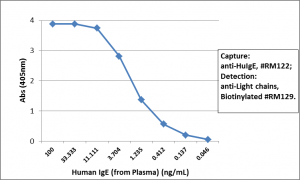anti-IgE (human) Rabbit Monoclonal (RM122) (Biotin)
| Code | Size | Price |
|---|
| REV-31-1024-02-C050 | 50 ug | £455.00 |
Quantity:
Prices exclude any Taxes / VAT
Overview
Antibody Isotype: Rabbit IgG
Antibody Clonality: Recombinant Antibody
Antibody Clone: RM122
Regulatory Status: RUO
Target Species: Human
Applications:
- Enzyme-Linked Immunosorbent Assay (ELISA)
- Fluorescence-activated cell sorting (FACS)
- Immunocytochemistry (ICC)
- Immunohistochemistry (IHC)
Shipping:
Blue Ice
Storage:
+4°C
Images
Documents
Further Information
Alternate Names/Synonyms:
Immunoglobulin E
Concentration:
1 mg/ml
EClass:
32160000
Form (Short):
liquid
Formulation:
Liquid. 50% Glycerol/PBS with 1% BSA and 0.09% sodium azide.
Handling Advice:
Avoid freeze/thaw cycles.
Immunogen:
Human IgE.
Labels - Conjugates:
Biotin
Long Description:
Recombinant Antibody. This antibody reacts to human IgE. No cross reactivity with human IgG, IgM, IgD, or IgA. Applications: ICC, IHC, FACS, ELISA. Source: Rabbit. Liquid. 50% Glycerol/PBS with 1% BSA and 0.09% sodium azide. Immunoglobulin E (IgE) is an antibody isotype that has only been found in mammals. IgE is synthesized by plasma cells. Monomers of IgE consist of two heavy chains (ε chain) and two light chains, with the ε chain containing 4 Ig-like constant domains (Cε1-Cε4). IgE's main function is immunity to parasites such as helminths or certain protozoan parasites such as Plasmodium falciparum. IgE may have evolved as a last line of defense to protect against venoms. IgE also has an essential role in type I hypersensitivity, which manifests in various allergic diseases, such as allergic asthma, most types of sinusitis, allergic rhinitis, food allergies and atopic dermatitis. IgE also plays a pivotal role in responses to allergens, such as: anaphylactic reactions to drugs, bee stings and antigen preparations used in desensitization immunotherapy. This anti-human secondary antibody has well-characterized specificity for human IgE immunoglobulins and is useful in the detection, sorting or purification of its specified target. In general, secondary antibodies offer increased versatility enabling users to use many detection systems (e.g. HRP, AP, fluorescence). They can also provide greater sensitivity through signal amplification as multiple secondary antibodies can bind to a single primary antibody.
NCBI, Uniprot Number:
P01854
Package Type:
Vial
Product Description:
Immunoglobulin E (IgE) is an antibody isotype that has only been found in mammals. IgE is synthesized by plasma cells. Monomers of IgE consist of two heavy chains (epsilon chain) and two light chains, with the epsilon chain containing 4 Ig-like constant domains (Cepsilon1-Cepsilon4). IgE's main function is immunity to parasites such as helminths or certain protozoan parasites such as Plasmodium falciparum. IgE may have evolved as a last line of defense to protect against venoms. IgE also has an essential role in type I hypersensitivity, which manifests in various allergic diseases, such as allergic asthma, most types of sinusitis, allergic rhinitis, food allergies and atopic dermatitis. IgE also plays a pivotal role in responses to allergens, such as: anaphylactic reactions to drugs, bee stings and antigen preparations used in desensitization immunotherapy. This anti-human secondary antibody has well-characterized specificity for human IgE immunoglobulins and is useful in the detection, sorting or purification of its specified target. In general, secondary antibodies offer increased versatility enabling users to use many detection systems (e.g. HRP, AP, fluorescence). They can also provide greater sensitivity through signal amplification as multiple secondary antibodies can bind to a single primary antibody.
Purity:
Protein A purified.
Source / Host:
Rabbit
Specificity:
This antibody reacts to human IgE. No cross reactivity with human IgG, IgM, IgD, or IgA.
Transportation:
Non-hazardous
UNSPSC Category:
Secondary Antibody Conjugates
UNSPSC Number:
12352203
Use & Stability:
Stable for at least 1 year after receipt when stored at -20°C.



